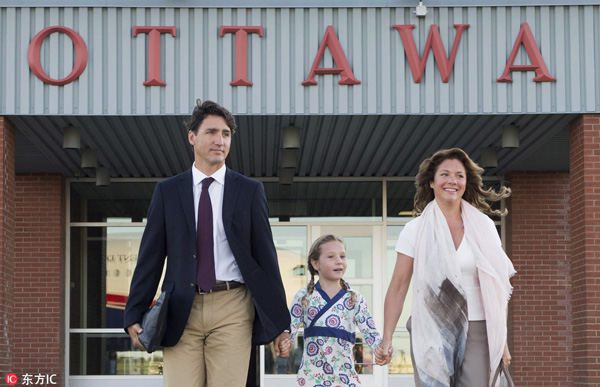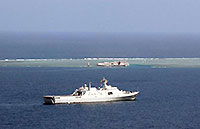Canadian prime minister leaves for China G20 summit
(Xinhua) Updated: 2016-08-30 08:53
 |
|
Canadian Prime Minister Justin Trudeau, his wife Sophie Gregoire, and daughter Ella-Grace prepare to board a government plane in Ottawa, August 29, 2016. [Photo/IC] |
This is the first time for Trudeau to visit China after he became prime minister last November, and the visit comes 43 years after his father Pierre Trudeau became the first Canadian prime minister to visit China in 1973.
The visit will take him to such places as Beijing, Shanghai, Hangzhou, and Hong Kong. He is expected to meet with Chinese government leaders, businesspersons, and members of the general public.
"Justin Trudeau will be in China as a Canadian prime minister extending the ground-breaking investment in a relationship initiated by a predecessor, who happens to have been his father," said Jeremy Kinsman, who is a professor at Ryerson University of Canada and was Canadian ambassador to Russia and to the European Union.
Canadian officials said the goal of Trudeau's visit is to "restart the relationship" with China. In particular, the Liberals feel they need to catch up with other countries that have developed or established stronger ties with China in recent years.
"Strengthening our relationship with China is essential to growing our middle class, and creating new opportunities for Canadian businesses. On this trip, I will strive for a closer, more balanced relationship between Canada and China -- one that unlocks the untapped potential in our two countries' commercial ties, and advances important issues like good governance, the rule of law and the environment," Trudeau said in a press release last week.
"Canada welcomes the agenda brought forward by China as this year's G20 host, which encourages members to work together towards an innovative, interconnected, and inclusive world economy," said the release.
Trudeau and Chinese President Xi Jinping met during the G20 summit in Turkey last November. They agreed to strengthen cooperation and work together in multilateral forums such as the UN, the G20 and APEC to promote a more robust, balanced and sustainable global economic growth.
Forty-three years after his father's historic footstep, Trudeau will visit a very different China, whose economic progress has lifted millions of people out of poverty and reforms have made it the second-largest economy in the world.
David Mulroney, Canada's ambassador to China from 2009 to 2012, said Canada now "needs to ensure it will have regular meetings with Chinese officials."
"We missed a number of years of regular dialogue with the Chinese," he said of the Harper government's years. "The most important thing is that we are back in the game."
"It's important for Canada to have a stable, steady, constructive, effective relationship with China," said Roland Paris, a former foreign policy advisor to Trudeau.







